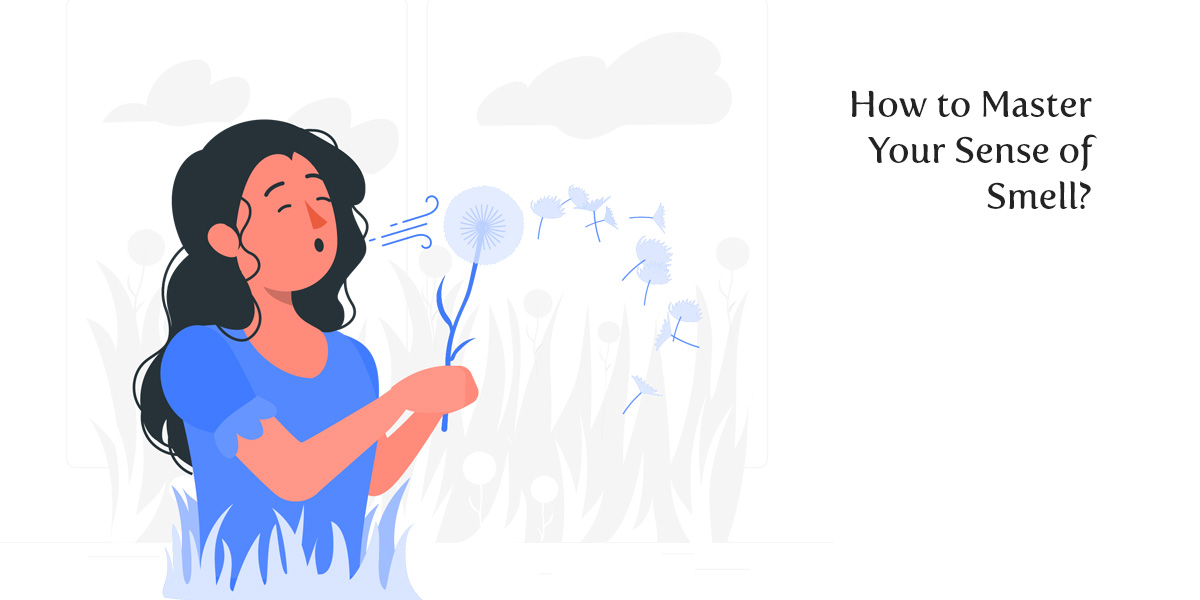Can We Master Our Sense of Smell?
While our sense of smell might seem passive, it’s incredibly adaptable and can be trained and honed over time. Here’s how:
1. Sensory Training
Practice Smell Identification: Engage in activities that challenge your ability to distinguish scents. Use essential oils or various herbs and spices to train your nose to differentiate between different smells.
Scent Memory Games: Challenge yourself to recall and identify scents. Blindfold yourself and try to identify various scents around your home or outdoors. This exercise enhances your olfactory memory.
Aroma Recognition: Pay attention to scents in different environments, associating each smell with its source. This practice helps in recognizing specific scents more accurately.
2. Mindful Smelling
Conscious Breathing: Practice mindful breathing exercises, focusing on the scents around you. Inhale deeply and pay attention to the smells, allowing yourself to fully experience them.
Mindfulness in Daily Activities: Bring awareness to the scents encountered during daily activities like cooking, gardening, or while taking a walk. Engage with the smells consciously, noting their subtleties.
3. Olfactory Exercises
Smell Kits: Create your scent kit with a variety of natural scents like fruits, flowers, spices, and essential oils. Regularly expose yourself to these scents, trying to differentiate and identify them.
Gradual Exposure: Introduce yourself to new scents slowly and deliberately. Take time to understand and become familiar with each smell, enhancing your olfactory recognition.
4. Professional Guidance
Consider seeking guidance from professionals, such as perfumers or aroma therapists, who can provide exercises and techniques to refine your sense of smell.
5. Patience and Persistence
Mastering your sense of smell takes time and consistent practice. Be patient with yourself and persist in your efforts, as the sense of smell, like any other skill, can be enhanced with dedication and practice.
The Science Behind the Sense of Smell
The sense of smell, or olfaction, is a complex process involving the detection of airborne molecules through specialized cells in the nasal cavity. Here’s a breakdown:
1. Olfactory Receptors: These receptors, located in the olfactory epithelium, contain specialized neurons that detect odor molecules. Humans have hundreds of different olfactory receptors that can identify various smells.
2. Molecule Detection: When odor molecules enter the nasal cavity during inhalation, they bind to specific olfactory receptors, initiating a biochemical reaction that sends signals to the brain.
3. Signal Transmission: The olfactory receptors convert chemical signals into electrical impulses, which are then transmitted to the olfactory bulb in the brain. The olfactory bulb processes these signals and sends them to different areas of the brain, including the limbic system and the cerebral cortex.
4. Brain Processing: The limbic system, associated with emotions and memory, and the cerebral cortex, responsible for conscious perception, play vital roles in interpreting and associating smells with emotions, memories, and perceptions.
Benefits of Mastering Your Sense of Smell
Enhanced Appreciation of Surroundings: A heightened sense of smell allows for a deeper appreciation of the world around you, from enjoying diverse cuisines to experiencing nature’s aromas.
Improved Memory and Emotions: Scents have a profound impact on memory and emotions. Mastering your sense of smell can evoke vivid memories and influence mood, fostering emotional well-being.
Refined Tastes: Smell plays a crucial role in tasting food. A more acute sense of smell can enhance the enjoyment and perception of flavors, leading to a richer culinary experience.
Safety and Health: A heightened sense of smell can alert you to potential dangers, such as spoiled food, gas leaks, or smoke, contributing to a safer environment.
Cultural and Social Connections: Smell is deeply intertwined with culture and social interactions. Mastering your sense of smell allows for a better understanding and appreciation of cultural scents and customs.
Career Opportunities: Some professions, like perfumers, sommeliers, chefs, and wine tasters, benefit significantly from a well-developed sense of smell. Mastery in this area can lead to career advancements.
By mastering your sense of smell, you not only enrich your sensory experiences but also improve various aspects of life, from health and safety to social interactions and personal enjoyment. Investing time and effort into refining this sense can open up a world of nuanced experiences and opportunities.
Practices to Develop Your Sense of Smell
Smell Training: Create a scent kit with various natural scents like herbs, spices, fruits, and essential oils. Practice regularly identifying and differentiating these scents.
Mindful Smelling: Engage in mindful smelling during daily activities. Pay attention to scents while cooking, gardening, or walking outdoors. Focus on the nuances and associations of different smells.
Aroma Recognition: Challenge yourself to identify scents blindfolded or in unfamiliar environments. This practice sharpens your olfactory memory and identification skills.
Deep Breathing Exercises: Practice conscious breathing, inhaling deeply and focusing on the scents around you. This helps in enhancing your sensory experience and awareness of smells.
Exploration of New Scents: Introduce yourself to new scents gradually. Take time to understand and become familiar with each smell, broadening your olfactory repertoire.
Professional Guidance: Consider seeking guidance from professionals like perfumers or aroma therapists. They can provide specialized exercises and techniques to enhance your sense of smell.
Conclusion
Mastering your sense of smell is an ongoing journey that involves deliberate practice, mindfulness, and exploration. By engaging in sensory training, mindfulness practices, and exposure to various scents, you can refine and develop your olfactory abilities over time.
A heightened sense of smell not only enriches your sensory experiences but also has practical benefits, from enhancing taste perception to improving memory and safety awareness. Embracing practices that nurture your sense of smell opens up a world of nuanced sensations and enriches your overall perception of the world around you. With patience and dedication, you can continue to hone and enjoy the remarkable capabilities of your olfactory sense.









Post a Comment